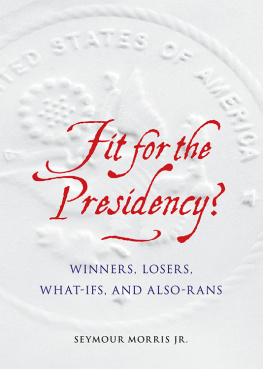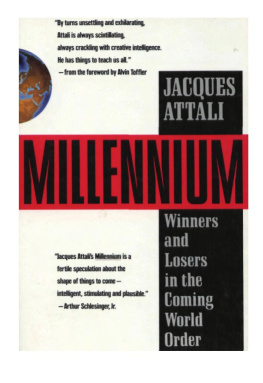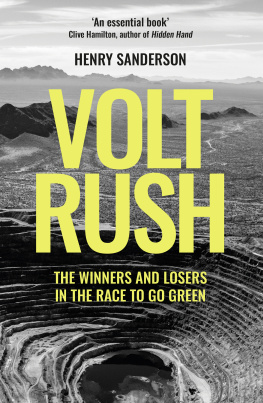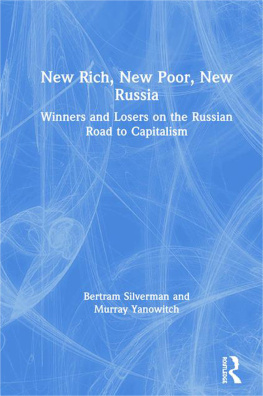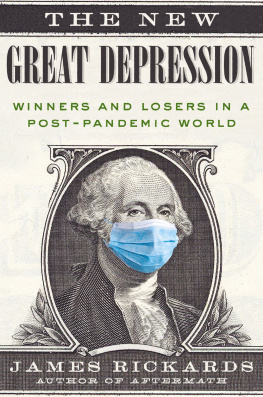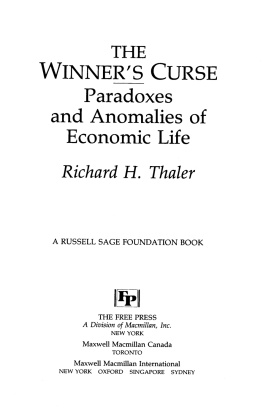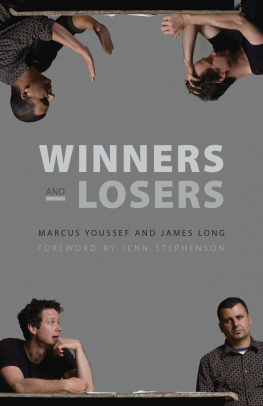Morris Jr. - Fit for the presidency?: winners, losers, what-ifs, and also-rans
Here you can read online Morris Jr. - Fit for the presidency?: winners, losers, what-ifs, and also-rans full text of the book (entire story) in english for free. Download pdf and epub, get meaning, cover and reviews about this ebook. City: Lincoln;United States, year: 2017;2016, publisher: Potomac Books, An imprint of the University of Nebraska Press, genre: Politics. Description of the work, (preface) as well as reviews are available. Best literature library LitArk.com created for fans of good reading and offers a wide selection of genres:
Romance novel
Science fiction
Adventure
Detective
Science
History
Home and family
Prose
Art
Politics
Computer
Non-fiction
Religion
Business
Children
Humor
Choose a favorite category and find really read worthwhile books. Enjoy immersion in the world of imagination, feel the emotions of the characters or learn something new for yourself, make an fascinating discovery.
Fit for the presidency?: winners, losers, what-ifs, and also-rans: summary, description and annotation
We offer to read an annotation, description, summary or preface (depends on what the author of the book "Fit for the presidency?: winners, losers, what-ifs, and also-rans" wrote himself). If you haven't found the necessary information about the book — write in the comments, we will try to find it.
Morris Jr.: author's other books
Who wrote Fit for the presidency?: winners, losers, what-ifs, and also-rans? Find out the surname, the name of the author of the book and a list of all author's works by series.
Fit for the presidency?: winners, losers, what-ifs, and also-rans — read online for free the complete book (whole text) full work
Below is the text of the book, divided by pages. System saving the place of the last page read, allows you to conveniently read the book "Fit for the presidency?: winners, losers, what-ifs, and also-rans" online for free, without having to search again every time where you left off. Put a bookmark, and you can go to the page where you finished reading at any time.
Font size:
Interval:
Bookmark:
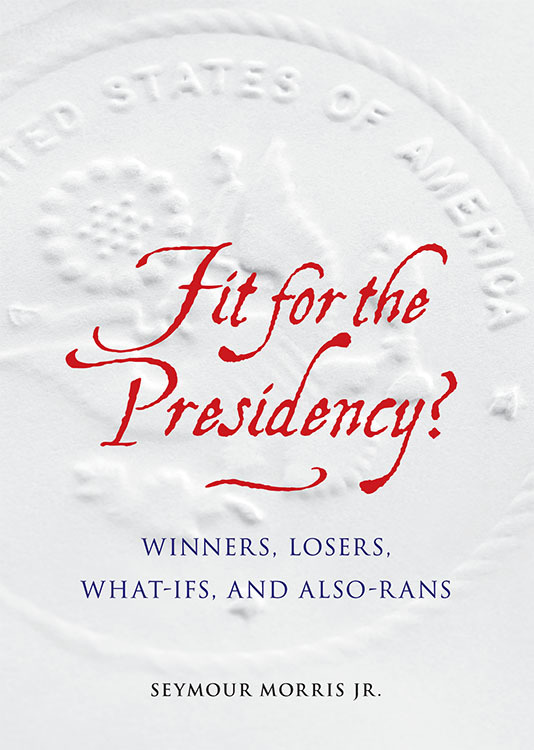
Full of juicy anecdotes and a valuable guide to voters deciding who gets to occupy the nations highest office. It could not have come at a better time.
Alvin Felzenberg, author of The Leaders We Deserved (and a Few We Didnt): Rethinking the Presidential Rating Game
Fascinating is much too tame to describe this ingenious journey through presidents and almost presidents and would-be presidents. White House buffs will be riveted and general readers amazed by what they learn about the most important job in America.
Thomas Fleming, author of The Great Divide: The Conflict between Washington and Jefferson That Defined a Nation
Seymour Morris Jr. is sure to provoke lively discussion with his creative rsum approach to evaluating fifteen American presidential candidates from George Washington to Ronald Reagan. Thoughtful and brash, balanced yet crisply argued, Fit for the Presidency? should be required reading for anyone who enjoys the privilege of being an American voter.
Walter R. Borneman, author of The Admirals and MacArthur at War
A fascinating, original look into the history of presidential politics, covering both the immortal (Lincoln) and the forgotten (Samuel Tilden), and an excellent primer on how to evaluate the current candidates for the qualities that make a great president.
John Steele Gordon, author of An Empire of Wealth: The Epic History of American Economic Power
Seymour Morris Jr.
Potomac Books
An imprint of the University of Nebraska Press
2017 by Seymour Morris Jr.
Cover designed by University of Nebraska Press; cover image iStockphoto.com/imagestock.
All rights reserved. Potomac Books is an imprint of the University of Nebraska Press.
Library of Congress Cataloging-in-Publication Data
Names: Morris, Seymour, author.
Title: Fit for the presidency?: winners, losers, what-ifs, and also-rans / Seymour Morris Jr.
Description: Lincoln: Potomac Books, An imprint of the University of Nebraska Press, 2017. | Includes bibliographical references.
Identifiers: LCCN 2016012184
ISBN 9781612348506 (cloth: alk. paper)
ISBN 9781612348872 (epub)
ISBN 9781612348889 (mobi)
ISBN 9781612348896 (pdf)
Subjects: LCSH : Presidential candidatesUnited StatesHistory. | Presidential candidatesUnited StatesBiography. | United StatesPolitics and government.
Classification: LCC JK 524 . M 67 2017 |
DDC 973.09/9dc23 LC record available at http://lccn.loc.gov/2016012184
The publisher does not have any control over and does not assume any responsibility for author or third-party websites or their content.
The story of U.S. presidents begins when they take the oath of office. Yet a key part of their lives took place before they reached the pinnacle, when they were candidates. What had they accomplished? What signals were there to suggest their future performance? How impressive were their rsums?
More than almost any other country, the United States has perfected the art of personnel selection. We apply stringent criteria when selecting a leader for a corporation or nonprofit institution: we require a detailed rsum and carefully check personal and professional references, a process known as due diligence; when the candidate comes in for an interview we ask difficult, probing questions. We want complete and accurate information, and we want to be objective and make a decision free of personal bias.
Electing a president is not the same as choosing a CEO , yet in many ways the process is comparable to the sorts of hiring decisions made every day by top managers and boards of directors of companies and nonprofits. It therefore seems reasonable to apply the same degree of discipline and analysis to filling elective offices. In Fit for the Presidency? I examine rsums and perform due diligence for the office of president just as a professional recruiter would do to fill a companys executive position. How does the candidate measure up on key criteria such as integrity and judgment? What in the candidates past suggests his potential success or failure as a president? Is there a good fit between the candidates skills and the needs of the country at the time? Is there anything in his
Important prior positions like governor or secretary of state invite inquiry about what exactly a potential president has accomplished. We once had a presidential candidate with a sterling job history: he had been a state legislator, diplomat, secretary of state, congressman, and senator. Unfortunately he was a man always one step ahead of his rsuman example of the Peter Principle at work. Good judgment comes from experience, and experience comes from prior bad judgment; this is why experience can be the best teacher. As every executive recruiter knows, one should beware of the star performer who has an unblemished record of success, who has never known failure or disappointment.
In evaluating a candidate for a top position, executive recruiters are careful not to accept prior success at face value but to analyze the types of organizations that have employed him, the reasons for his success, and whether he can translate his success to a different culture and organization. Wendell Willkie, for example, had no political or government experience, but his work as head of an electric utility dealing with regulators and the public qualified him for the presidency because its very similar to what a president does. George Marshall, even though he spent his entire career in the military and had never run for public office, demonstrated superb strategic thinking and personnel management skills worthy of a president.
...
In this book I present the rsums of presidential candidates and all the important information known about them at the time they ran. Would you have voted for this person? Did he demonstrate the qualities we should look for in todays candidates?
In choosing candidates to profile, I sought a reasonable balance of insiders and outsiders, Republicans and Democrats, visionaries and doers, liberals and conservatives, candidates well-known and candidates not well-known. No judgment is meant to be implied by the selection. Avoiding any attempt to label the candidate as one extreme or the other, I have endeavored, eschewing all gossip, legends, and opinions, to simply detail facts and professional character references for which we have hard evidence. If the result is to show a candidate in a better or worse light than is commonly perceived, it is not due to any desire to whitewash or smear him but simply to let the evidence speak for itself and let you draw your own conclusions.
Some of these candidates turned out to be giants of the presidency; others are now largely forgotten; and a few probably should have wonour nations loss. Five candidates made it to the White House, and ten did not (a few of whom didnt even make it to the nomination, though they were considered top candidates). My examination of each candidate begins with a brief background and a detailed rsum, followed by an assessment of qualifications and a summary ratingoutstanding, excellent, fair, or poorbased on the key criteria of accomplishments, intangibles, and judgment and a category named Overall that encompasses all the information we have on the man. Each chapter closes with a review of what happened after the election. In almost every case the candidates future performance could have been predicted (Abraham Lincoln being a major exception).
Font size:
Interval:
Bookmark:
Similar books «Fit for the presidency?: winners, losers, what-ifs, and also-rans»
Look at similar books to Fit for the presidency?: winners, losers, what-ifs, and also-rans. We have selected literature similar in name and meaning in the hope of providing readers with more options to find new, interesting, not yet read works.
Discussion, reviews of the book Fit for the presidency?: winners, losers, what-ifs, and also-rans and just readers' own opinions. Leave your comments, write what you think about the work, its meaning or the main characters. Specify what exactly you liked and what you didn't like, and why you think so.

